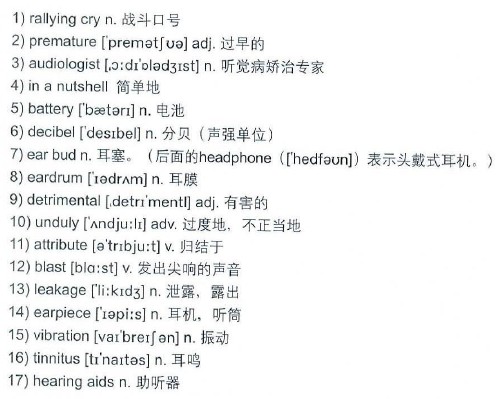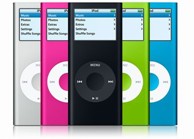 对于时尚追求者来说,拥有一个iPod的急迫心理,既在于它本身的功能吸引,更在于它所带来的心理炫耀和安慰因素。甚至于连iPod的白色耳线,都成为一种时尚的象征。然而,就在那根象征着年轻与时尚的白色耳线泛滥于街头时,我们也不禁要思考,这种时尚的代价是什么?
对于时尚追求者来说,拥有一个iPod的急迫心理,既在于它本身的功能吸引,更在于它所带来的心理炫耀和安慰因素。甚至于连iPod的白色耳线,都成为一种时尚的象征。然而,就在那根象征着年轻与时尚的白色耳线泛滥于街头时,我们也不禁要思考,这种时尚的代价是什么?
专家指出,长时间、大音量地收听iPod或其他MP3音乐播放器,会引起永久性听力丧失。那么,究竟怎样才算长时间、怎样才算大音量?究竟,在时尚与健康之间,我们又该如何选择?
这则podcast语速较快,比较适合泛听。另外建议各位读者,经过泛听大概掌握内容后,可就这个话题准备一个“一分钟演讲”。最后翻到后面的“The iPod Debate”部分,看看其他人对于这个话题又有怎样的看法。
发音:美式发音 语速:160词/分钟 使用方法:泛听+一分钟演讲
(Music)
It’s oh so quiet
Shhh, Shhh
It’s oh so still
Shhh, Shhh
(音乐)
现在是如此安静
嘘,嘘
现在是如此静谧
嘘,嘘
John (Host): “If it’s too loud, you’re too old.” That used to be the 1)rallying cry of young music-lovers everywhere. But these days, try, “If it’s too loud. You’re taking a big risk.”
约翰(主持人):“如果这太大声了,那说明你太老了”。这曾经是世界各地年轻的音乐爱好者的战斗口号。但如今,可能得这么说了,“如果这太大声了,那你就危险了。”
To begin, now that Apple has sold over 175 million iPods and remade the music business and changed the way we buy music, it’s time to consider something else that MP3 players like the iPod can hurt our hearing. More than two thirds of iPod users face 2)premature deafness, says one study. And no wonder. The players can get nearly as loud as a jet engine at takeoff.
开始这个话题之前我们先来看看,苹果公司已经售出超过一亿七千五百万台iPod,重整了音乐行业,也改变了我们购买音乐的方式,既然如此,是时候来考虑一下其他问题,比如说像iPod这样的MP3播放器对我们听力的伤害。一项调查指出,超过三分之二的iPod使用者都面临过早耳聋的问题。其实这并不奇怪。这些播放器的音量可以达到喷气式发动机在飞机起飞时所发出的音量。
3)Audiologists say they’re seeing more young people with old ears.
听觉病矫治专家说,他们发现越来越多的年轻人的实际听力水平比应有水平差得多。
Joining me in the studio is Dr. Ellen Finkelstein. She’s an audiologist at Madison Audiology Associates here in Manhattan. Ellen Finkelstein, thank you for joining us.
在演播室跟我一起的是艾伦·芬克斯坦恩博士。她是位于曼哈顿的麦迪逊听力协会的听觉病矫治专家。艾伦·芬克斯坦恩,谢谢你来跟我们一起聊天。
Ellen (Guest): My pleasure.
艾伦(嘉宾):这是我的荣幸。
John: So, 4)in a nutshell, are MP3 players making us deaf?
约翰:那么,简单来说,MP3播放器会不会致聋?
Ellen: They’re contributing to our earlier loss of hearing because what’s happening is that previous technology did not…we…it didn’t have the loudness capability or the 5)battery life or the…to allow people to be hearing sounds and music for extended periods of time.
艾伦:它们的确会导致过早的听力减退,因为现在的情况是以前的科技没有……我们……它没有音量调节控制能力,或者它的电池寿命(不长)或者其他的技术……使得人们没办法长时间地收听声音或音乐。
John: Is that the big difference between iPods and the Sony Walkman back in, like, 1980, because, you know, we had this conversation 27, 28 years ago.
约翰:这是不是iPod和20世纪80年代左右出现的索尼随身听最大的不同?因为,你知道,这个问题我们大概27、28年前就讨论过。
Ellen: Absolutely! The newer generation of iPods or MP3 players held [sic] thousands of songs, and the battery life is extended and they have the capabilities of going up to about 130 6)decibels. So, that combined with the fact that we’re now using 7)ear buds, which are closer to the 8)eardrum, we’re—and people are just walking around with them constantly—this is contributing to earlier hearing loss.
艾伦:没错!现在新一代的iPod和MP3播放器能存放上万首歌曲,电池使用时长也延长了,而且它们的音量最高能达到130分贝。因此,再加上我们现在使用的是更贴近于耳膜位置的耳塞,我们——还有人们到哪儿都戴着耳机——这种种事实都会造成过早的听力减退。
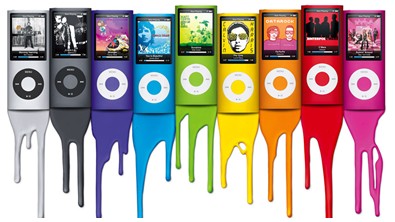
John: So… 约翰:那么……
Ellen: When…when you look at it, it’s duration and decibel levels, so the combination of the two of them is really very 9)detrimental to hearing.
艾伦:当……当你认真思考这件事时,会发现主要问题是(使用MP3播放器等的)使用时间长度和分贝大小,这两者结合起来对听力的伤害是相当严重的。
John: So, the higher the decibel level, the smaller amount of time your ears can…can absorb that without 10)unduly damaging the little hairs inside.
约翰:那么,分贝越高,你听的时间就应该越短,才能保证不伤害耳朵内的纤毛组织。
Ellen: That’s correct.
艾伦:没错。
John: So, how extensive is the problem now? I mean, this one study says up to two thirds of iPod users are at risk.
约翰:那么,现在这个问题有多普遍呢?我是说,这个研究表明有高达三分之二的iPod使用者都有(听力早衰的)风险。
Ellen: Well, that sounds very reasonable, because about 10 million people suffer noise-induced hearing loss, which is about a third of the hearing losses that we see are 11)attributed to noise exposure, so that we also see younger children using iPods for extended periods of time. We see people on subways 12)blasting iPods or MP3 players for extended periods of time to block out the environmental noise. So, I always…when I’m on a subway or on a bus or in the street, I know that if I’m sitting next to somebody and I can hear their iPod or I can hear the 13)leakage, we’re in trouble, that that person is really experiencing a good risk of hearing loss.
艾伦:嗯,的确是这样,因为现在有大约1000万人正忍受着噪音性听力丧失的折磨,这大概占了由噪音造成的听力丧失案例数量的三分之一。我们经常看到那些年纪不大的孩子长时间地使用iPod。我们在地铁上经常看到那些人为了阻隔外界环境的噪音,长时间地把iPod和MP3播放器的音量调到很大。所以,我总是……当我乘坐地铁或者公共汽车或者走在路上时,我知道如果坐在我旁边的人,他们的iPod发出的声响连我都能听到,那么问题就大了,因为那个人真的很有丧失听力的危险。
John: So, is it the fact that the…that the, the current generation of players, that the 14)earpiece actually sits inside your ear? Is it a different thing if you have old-fashioned headphones that cover your ears?
约翰:所以,事实就是……就是……这与现在新一代的把听筒置入耳朵之中的播放器有关?如果你还是佩戴那种老式的头戴式的耳机,情况是不是有所不同?
Ellen: Well, there’s research being done as…there’s no definite answer to that. They’re really researching that, but from…from a…if you look at it logically, the closer you are to the eardrum, the louder the sound, the worse the 15)vibrations that are going through, and the worse the problem, the more potential a problem.
艾伦:呃,关于这个也有一些研究……不过并没有什么明确的答案。研究者的确进行了调查,不过从……从一个……如果你按逻辑来看,与耳膜越近、声音越大,穿过耳膜的声音振幅就越大,那么问题就越严重,而且越有潜在的危险。
John: Alright, now you mention research. There was a study done recently at the University of Colorado in association with the Children’s Hospital of Boston that suggests that teenage boys listen to music at a louder volume than teenage girls, that teens just in general play their music louder, and that they don’t even realize how loud it is; they think it’s a normal…you know, that teenager on the bus that you’re talking about, with the sound bleeding out of his or her ear buds, thinks it’s a perfectly normal room level kind of sound and doesn’t realize how loud it is. Do these findings surprise you? Do they...do theysort of fit with what you’re seeing in your practice?
约翰:好的,你刚刚提到了调查研究。最近,科罗拉多州立大学和波士顿儿童医院联合做了一项研究调查,结果显示男孩子听音乐时所用的音量要比女孩子的大,另外一个普遍现象是,青少年听音乐时所用的音量都比较大,而且他们甚至都没有意识到那究竟有多大音量,他们还认为那是正常音量……你知道的,就像你刚刚提到的公共汽车上的青少年,声音已经大到从他们的耳塞里传出来了,他们还觉得那只是很平常的普通音量大小,并没意识到实际音量有多大。你对这些结果感到震惊吗?它们……它们是不是与你从业中实际遇到的情况相符合?
Ellen: They absolutely do not surprise me because, first of all, teenagers and...and having grown up with loud music and rock and roll and whatever, teenagers and… they love to blast music, they love to hear music louder, so that’s…that’s just the nature of the beast. But also, the more exposure that they have to noise and the closer it is to the drum, it really…we’re seeing…we’re seeing hearing losses way younger than we ever did before.
艾伦:我一点都不感到奇怪,因为,首先,年轻人,他们听着音量极大的音乐长大,如摇滚之类,他们……他们喜欢爆炸性的音乐,他们喜欢用很大的音量来听音乐,所以这个只是……这个是问题的根本所在。而且,他们接触的噪音越多,他们的耳塞距离耳膜的距离越近,那真的……我们也见到……我们现在见到的很多听力丧失的病人年龄跟以往相比要小得多。
John: So is your clientele changing?
约翰:那么你的客户群有改变吗?
Ellen: My…my practice has shifted. The average age level in my practice has shifted down significantly. I’m seeing younger…younger children, younger kids. Kids are experiencing noise-induced hearing loss with some 16)tinnitus or ringing in the ears, where, when I first started out dispensing 17)hearing aids, for example, maybe the average age of my patient was in their late 70s or early 80s. A very big part of my practice now are[is] people in their 50s, in their 60s, and a lot of the reason that they’re coming in earlier has to do with the fact that they’ve been exposed to noise. Now that was before having iPods…
艾伦:我的……我的实际工作在发生变化。我接触的病人的平均年龄有了很明显的下降趋势。我看到越来越多很年轻的……年纪小的孩子,小孩们。现在的小孩都出现耳鸣或耳朵里有铃声这些噪音性听力丧失的症状。然而,举个例子来说,在我刚开始发配助听器时,可能我当时病人的平均年龄都是70岁后期或80左右。而我现在的工作对象有相当一部分都是50多岁、60多岁的人。而他们提早遭遇听力丧失症状的原因必然跟他们长期接触噪音有关。这还是在iPod……
John: Mm hmm.
Ellen: …and MP3 players and whatever, so…
John: That’s the 18)Pete Townsend generation.
Ellen: That’s correct.
John: Now we’re talkin’ about the 19)Justin Timberlake generation.
Ellen: Right, so shift that down, fast forward a little bit, shift that age down, so I anticipate seeing a way younger individuals for hearing aids or for 20)diagnostic testing related to hearing loss than I’ve…than I’ve been experiencing in the past.
约翰:嗯嗯。
艾伦:……和MP3播放器之类的东西出现之前,因此……
约翰:那是皮特·唐森德时代。
艾伦:没错。
约翰:现在我们说的是贾斯汀·汀布莱克时代。
艾伦:对,所以又有变化,(听力丧失的)速度更快,年龄更低。我预计会见到一批相当数量的听力受损的年轻人必须求助于助听器或其他耳朵诊断测试,数量大大多于我在过去见到的。
The iPod Debate iPod辩论赛 时尚与健康,孰轻孰重? Does "What's Hot" outweigh "What's Healthy"?
Slaves to the Music
支持者—音乐发烧友 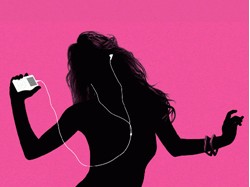
● iPods are all the rage. There is no better way to drown out a nagging mother. If you don’t have one, you’re missing out.
Tips: iPod可以说风靡全球(all the rage),在全球各地的街头巷尾,随处可见佩戴着iPod最具标志性的白色耳机的年轻人。对于他们来说,iPod是把妈妈的唠叨统统屏蔽的最好方法了。“drown out”表示“淹没、压过”的意思,用iPod来“drown out a nagging mother”,正是听着iPod,不去理会妈妈的唠叨叮咛的意思。
● They aren’t going out of fashion anytime soon. So I say “If you can’t beat ’em, join ’em.”
Tips: 按照iPod的流行趋势,它们不可能轻易地就退出时尚舞台。既然改变不了潮流,不如随波逐流更开心。“If you can’t beat ’em, join ’em.”是颇常见的口头语,这里“’em”是“them”的缩写形式。中文有句文绉绉的话,表达的却是相同的意思——无力胜之则从之。
● Music should be cherished and worshipped. If pumping it down my ears will have consequences later in life, so be it.
Tips: 这个说话者无疑是音乐的热情发烧友了。他认为音乐就是用来珍惜的,顶礼膜拜的。如果说声音大小会对耳朵造成怎样的后果的话,也随便了(so be it)。“So be it.”表示接受已成定局的事实,根据语境不同而有不同的理解,通常可译成“那好吧。”或“该怎么样就怎么样吧。”等等。
● Some songs can only be appreciated at full volume. It’s our own finger on the trigger. We are aware of the risks.
Tips: 有些歌曲非要开足了音量才能显出它的特别之处。这位说话者就认为,用多大音量听音乐那是个人选择的问题(It’s our own finger on the trigger)。当然了,他也知道(be aware of sth.),音量太大的确有伤害听力的风险。“trigger”指手机的扳机,搭在扳机上的手指的任何一个动作,都有决定性意义。因此,“It’s our own finger on the trigger”这句话正用来说明“无论如何,这都是我们的选择”的意思。
Defenders of the Ear Drum
反对者—耳朵保护者
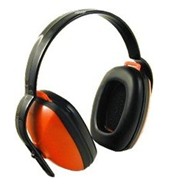 ● Sure, it may not affect me until I have one foot in the grave, but I’d like to be able to hear my grandkids’ voices.
● Sure, it may not affect me until I have one foot in the grave, but I’d like to be able to hear my grandkids’ voices.
Tips: 使用iPod或其他MP3播放器给耳朵带来的伤害,可能要到年纪大了、一只脚都迈进坟墓时(have one foot in the grave)才显现出来,但这位说话者显然更加愿意保护好耳朵,以能够听到儿孙们的欢声笑语,颐养天年。
● The experts have laid out the evidence and it’s crystal clear. You don’t have to be the sharpest tool in the shed to figure out what to do.
Tips: 关于听MP3会对耳朵有所伤害的事情,专家们已经列举了大量证据和例子,结论是再明显不过了(crystal clear)。因此,也没必要故作聪明地大肆宣扬应该怎么做。“crystal”,水晶。如水晶一样清透纯粹,就是形容某事再清晰不过,显而易见。而当我们要赞扬一个人很聪明时,我们就可以把他说成是“the sharpest tool in the shed”。不过,“the sharpest tool in the shed”这个词组通常用于否定式,比如说:I know I’m not the sharpest tool in the shed.(我知道我并不聪明。)
● It’s almost the same mentality as smoking. As they say, you can lead a horse to water, but you can’t make it drink.
Tips: 其实人们用MP3听音乐这件事跟吸烟的心理差不多。这位说话者认为,我们尽可以规劝他们,跟他们说这样有损健康,但他们最终能不能听进去,就不得而知了。“You can lead a horse to water, but you can’t make it drink.”这句谚语浅显易懂,中文也有一句对应的谚语呢——师父引进门,修行在个人。
● I understand everyone has different tastes. However, I like my music the same way I like my women; quiet and out of my ears.
Tips: 人嘛,都有不同的喜好的。以这位说话者为例,他喜欢的音乐类型就是安静,不扰耳根清净的。他还幽默地表示,他喜欢的女性类型也如此哦。
